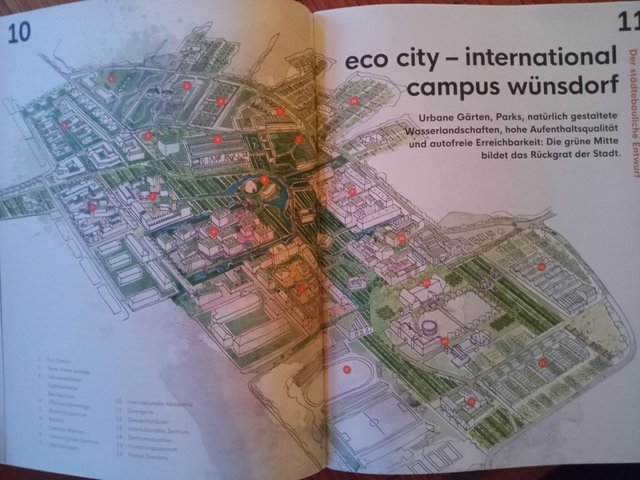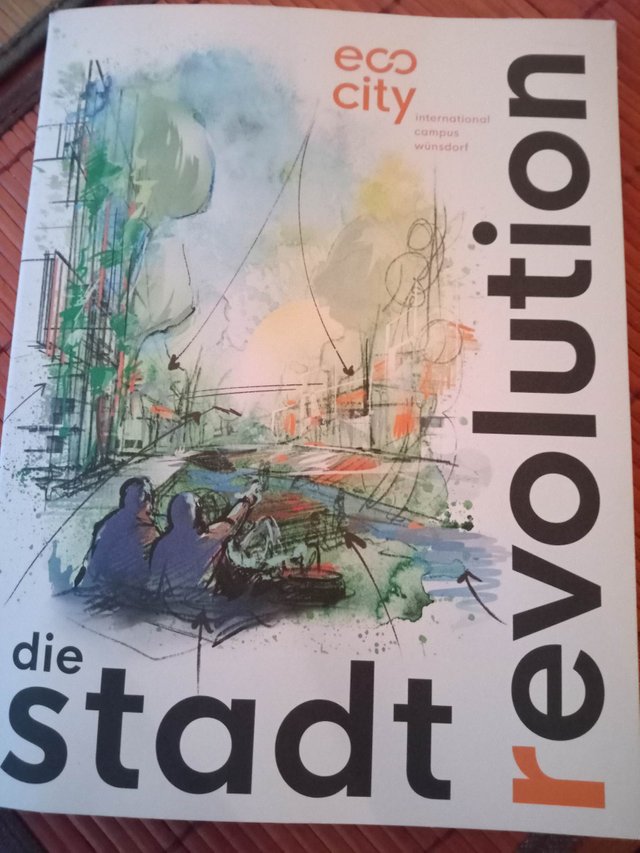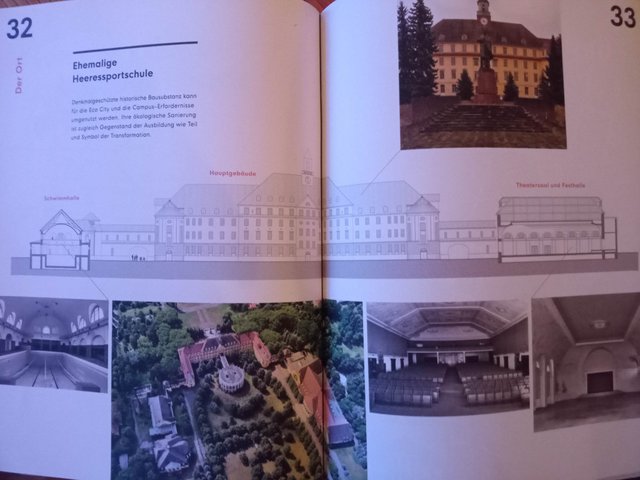Weiter im Text: Mobilitätswende und Neues Leben / Further in the text: Mobility Turnaround and New Life
english below...
Ich berichtete unlängst vom Start einer neuen transdisziplinären Kooperation in Sachen umweltgerechter Verkehr, Städteplanung etc.
https://steemit.com/hive-146118/@weisser-rabe/wochenendprogramm-weekend-program
Ein konkretes Projekt kann ich schon etwas näher vorstellen. Es nennt sich "Stadt-Revolution" und bezieht sich auf eine abgeschlossene Siedlung ca. 20 Kilometer südlich von Berlin in Wünsdorf. In der Gemeinde gibt es ein umfriedetes Areal, das seit 1910 für militärische Nutzungen verfügbar gehalten wurde: preußische Truppen, Reichsheer, Wehrmacht... Nach dem Ende des Zweiten Weltkriegs bezog die Rote Armee den Standort. Bis zur deutschen Wiedervereinigung 1990 war dort der größte sowjetische Militär-Stützpunkt außerhalb der damaligen Sowjetunion angesiedelt.
Nach der Wende passierten einige hilflose Versuche, das Gelände zum einen von Altlasten zu beräumen und es zum anderen einer vernünftigen Weiternutzung zuzuführen. Eine Weile saß dort das Landesamt zur Regelung offener Vermögensfragen (Treuhandgesellschaft) und einige der Kasernen wurden zu Wohnzwecken hergerichtet. Heute sind dort Flüchtlinge untergebracht. Der überwiegende Teil der Anlage verfällt allerdings nach und nach...
Hier setzt das Konzept der Eco-City-Gesellschaft an. Durchgeplant und kalkuliert ist die Schaffung einer sogenannten 15-Minuten-Stadt. Alle nötigen Wege und Besorgungen sollen innerhalb dieser Zeit zu Fuß realisierbar sein. Wohnen, Arbeiten, Lernen, Einkaufen, Sport treiben, Produzieren, Kultur schaffen und genießen, Netzwerken, ..., Leben. Die Idee dazu wurde 2017 vorgestellt und nach geeigneten Standorten gesucht. Mit Wünsdorf bietet sich eine Gelegenheit, eine Art Mustersiedlung zu errichten, nach deren Beispiel dann weltweit neue Baukonzepte umgesetzt werden könnten. Das Ganze wird breit von Land, Bund und EU gefördert, außerdem sitzen einige finanzstarke Sponsoren mit im Boot.
Momentan herrscht Aufbruchstimmung: die erste Phase der Umsetzung wurde eingeläutet. 1.200 Auszubildende aller handwerklichen Richtungen - die auch, teils mit ihren Familien, dort bereits eingezogen sind - bauen im Rahmen ihrer Lehre den Campus auf. Alle nötigen Gewerke sind vertreten. Auch die Ausbilder wohnen vor Ort. Dazu gehört ebenfalls ein landwirtschaftlicher Bereich, der die Grundlagen für die spätere Selbstversorgung schafft. Neue Wege der Agri-Forstwirtschaft, Indoor-Farming und Permakultur-Anbau werden erprobt und bei Erfolg etabliert.
In der 2. Phase werden weitere 2.700 Auszubildende und angehende Ingenieure sowie Techniker angesiedelt, die dann - wiederum im Zuge ihrer Ausbildung - die Infrastruktur weiter aufbauen und nutzen. Es entsteht eine Akademie, ein Interkulturelles und ein Interreligiöses Zentrum, Sportstätten, gastronomische Einrichtungen...
Die 3. Phase wird geprägt sein von der Installation eines Mobilitätszentrums, das mit der Kombination verschiedenster Angebote den Bedarf der gegenwärtigen und künftigen Einwohner gewährleisten soll. Die Selbstverwaltung bekommt ein Gebäude, wie auch Gästehäuser und Hotellerie mit ins Spiel kommen. Hier geht man bereits von weiteren 6.200 Auszubildenden, Arbeitskräften und ihren Familien aus. Man erwartet übrigens auch, daß ein großer Teil der jungen Leute, die den Werdegang so entscheidend mitprägen, nach Abschluß ihrer Ausbildung vermutlich mit dem Projekt verbunden bleiben werden.
Phase 4 ist dann der Abschluß des ökologischen Umbaus mit der maximal möglichen Erweiterung in der Fläche, der vollständigen Nutzbarkeit aller Anlagen und Innovationen, ein erreichter Grad der Selbstversorgung mit Lebensmitteln von mindestens 80% und der Schaffung von Arbeits- und Wohnstätten für weitere 10.000 Menschen.
Das ist Utopie. Allerdings auf dem besten Weg in die Realität. Ich persönlich kann mir ein Leben in so einer Gemeinschaft nicht vorstellen für mich - auch wenn es sicher grüner und organischer aussehen wird als unsere heutigen Städte, wäre es mir dennoch zu "eng". Zu dicht an anderen Leuten. Allerdings sehe ich es als große Chance für zukünftiges städtisches Leben. Auch hier werde ich natürlich in Abständen weiter berichten...



english version:
I recently reported on the launch of a new transdisciplinary cooperation on sustainable transport, urban planning, etc.
https://steemit.com/hive-146118/@weisser-rabe/wochenendprogramm-weekend-program
I can already present one concrete project in a little more detail. It is called "City Revolution" and refers to a self-contained settlement about 20 kilometres south of Berlin in Wünsdorf. There is an enclosed area in the community that has been kept available for military use since 1910: Prussian troops, Reichsheer, Wehrmacht... After the end of the Second World War, the Red Army moved into the site. Until German reunification in 1990, the largest Soviet military base outside the former Soviet Union was located there.
After the fall of communism, several helpless attempts were made to clear the site of contamination on the one hand and to put it to a sensible further use on the other. For a while, the State Office for the Settlement of Open Property Issues (Treuhandgesellschaft) was located there and some of the barracks were converted into housing. Today refugees are housed there. However, the majority of the complex is gradually falling into disrepair...
This is where the concept of the Eco-City Society comes in. The creation of a so-called 15-minute city is planned and calculated. All necessary routes and errands are to be achievable on foot within this time. Living, working, learning, shopping, doing sports, producing, creating and enjoying culture, networking, ..., living. The idea was presented in 2017 and suitable locations were sought. Wünsdorf offers an opportunity to build a kind of model settlement, the example of which could then be used to implement new building concepts worldwide. The whole thing is broadly funded by the state, federal government and EU, and there are also some financially strong sponsors on board.
At the moment, the mood is one of optimism: the first phase of implementation has begun. 1,200 apprentices of all trades - some of whom have already moved in with their families - are building the campus as part of their apprenticeship. All the necessary trades are represented. The trainers also live on site. This also includes an agricultural area that lays the foundations for later self-sufficiency. New ways of agri-forestry, indoor farming and permaculture cultivation are tested and established if successful.
In the second phase, another 2,700 trainees and future engineers and technicians will be settled, who will then - again in the course of their training - continue to build and use the infrastructure. An academy, an intercultural and an interreligious centre, sports facilities, catering facilities... will be built.
The third phase will be characterised by the installation of a mobility centre, which is to guarantee the needs of the present and future inhabitants with a combination of the most diverse offers. The self-government will get a building, and guest houses and hotels will also come into the picture. Here, it is already assumed that another 6,200 trainees, workers and their families will come. Incidentally, it is also expected that a large number of the young people who have played such a decisive role in the project will probably stay with the project after they have completed their training.
Phase 4 is then the completion of the ecological conversion with the maximum possible expansion in the area, the complete usability of all facilities and innovations, an achieved degree of self-sufficiency with food of at least 80% and the creation of work and living places for another 10,000 people.
This is utopia. However, it is well on the way to becoming reality. Personally, I can't imagine living in such a community for myself - even though it will certainly look greener and more organic than our current cities, it would still be too "cramped" for me. Too close to other people. However, I see it as a great opportunity for future urban living. Here, too, I will of course continue to report at intervals...
Dear @apnigrich - feel welcome to follow the continuation of my report ;-))
Juhuu ein neues Sektenzentrum ???
Keine Ahnung , so "!wir" haben schon damals gern in diese Richting geträumtiert , mit Gemeinschaft und Öko ??
Aber so #ESTABLISHMENT war schon immer doof , und genau danach siehts aus , und nicht vergessen das "demokratische" Verwalten des Ganzen ????
Höhö , #WOHNENUNDARBEITEN . . . . . . .
!invest_vote
Ich würde es nicht von Anfang an negativ sehen wollen. Wobei Du in einigen Punkten näher dran bist, als Du vielleicht denkst - dazu scheibe ich demnächst mehr. Gemeinschaft und Öko ist per se nicht verkehrt, meine ich. Und wenn es schon urbanes Leben geben muß, aufgrund der hohen Bevölkerungszahlen, dann gerne vorwiegend auf so eine Art und Weise.
Hihi , #NEGATIV .
!invest_vote
!gen the negative
!invest_vote
@udabeu denkt du hast ein Vote durch @investinthefutur verdient!
@udabeu thinks you have earned a vote of @investinthefutur !
@udabeu denkt du hast ein Vote durch @investinthefutur verdient!
@udabeu thinks you have earned a vote of @investinthefutur !
Oh wow!
I absolutely love the idea. I do believe that these kind of cities will be the cities of the future and a will make a difference to Mother Earth.
I read an article about Masdar City in Abu Dhabi and what they want to achieve in a resource lacking place, a desert, is absolutely mind blowing.
It is something our government needs to look into. Umh... maybe I'm expecting too much of them.
However, I must agree with you, I won't like to stay there. I also like wide open spaces and to be FREE.
It is very interesting.
At first I wanted to say that similar eco-settlements are being built here, but then I realized that we are talking about something completely different - a real eco-city. And I think you will succeed. I think that the money allocated for the construction of this city will not settle in the pockets of officials and their friends.
The Soviet Army left a big legacy in Germany, not the best. A guy who served in Germany at that time worked with me and told me how they closed these military camps. They buried equipment in ravines and even just dug large pits and dumped everything there from what they could not sell.
I saw a documentary later about these military cities that were like an abscess in Germany. Apparently, we are talking about just such a place.
I know a lot of guys who served in Germany. They probably had the most delightful memories in their lives. I remember how cheerful my neighbor came from Germany. I was about 14 years old then. And what happened to this funny guy who talked so interestingly about Germany? He became an alcoholic and his whole life went down the toilet.
I will wait for the continuation.
A very interesting project. I wonder what adjustments real life will make to it.
Ich denke ein wichtiger Bestandteil der sog. Mobilitätswende ist der kostenlose öffentliche Nahverkehr und der sehr günstige Fernverkehr. Siehe 9€ Ticket.
Solange es nicht interessant ist, mit den öffentlichen zu fahren, ist es verschwendete Liebesmüh zu hoffen, dass sich nachhaltig etwas ändert.
Wenn alle Elektroautos fahren, dann stehen eben wieder 5000 Elektroautos im Stau. An der Anzahl der Fahrzeuge oder der Effizienz Verkehr hat sich damit gar nichts geändert.
Hier ist es so, dass der Nahverkehr so teuer ist, dass es sich ab 3 Personen lohnt mit dem Taxi zu fahren. Und ab zwei Personen kann man problemlos mit dem Auto drüber nachdenken, reinzufahren.
Einfach zu teuer, zu langsam und teilweise zu schlecht erreichbar.
Damit müsste man anfangen, wenn man ein Umdenken erreichen will.
Aber nur mit Verboten und Verteuerungen wird man schwerlich ein Umdenken erreichen, dass nachhaltig ist.
Die Kosten sind da ein wichtiger Punkt. Mindestens ebenso wichtig dürften Zuverlässigkeit und Funktionalität sein. In Berlin leider Wunschdenken. Abgesehen davon könnte man den Individualverkehr deutlich entzerren durch versetzten Arbeitsbeginn - wir leben immer noch im 9 to 5 - Rhythmus. Das muß nicht sein. Präsenz im Büro muß ein Angebot werden und keine Pflicht mehr sein. Das ganze System muß sich ändern - dann haben wir ganz ohne Verbote viel mehr erreicht als jetzt mit diesen dogmatischen Ansätzen (die die Falschen treffen).
Ich habe leider das Gefühl, dass momentan teilweise mehr Ideologie vorherrscht, anstatt Pragmatismus und Realitätssinn.
Anstatt viele kleine Dinge zu ändern, die einfach geändert werden müssen, gibt es immer den großen Ansatz für alle. Und das wird in der Regel halt nichts.
Wenn ich mir dann anhöre, dass der bayerische Verkehrsminister einen Ausbau der A8 plant, bei dem 80 Hektar Fläche versiegelt werden.... Was soll denn das? Mehr Straßen bedeuten noch mehr Verkehr.
Anstatt über Knotenpunkte zu diskutieren wäre es interessant zu wissen, warum die Bahn so unattraktiv ist. Und da auch nachhaltig nichts dran geändert wird...
Thanks for supporting @se-witness with your witness vote. Heres a free vote!
@udabeu denkt du hast ein Vote durch @investinthefutur verdient!
@udabeu thinks you have earned a vote of @investinthefutur !